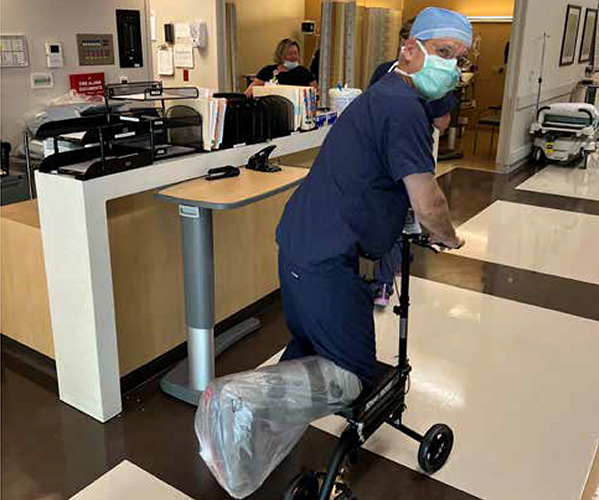
Despite breaking his right fibula, Dr. John T. McElveen, Jr., resumed his regular clinic and surgical schedule on crutches and with a boot. He used a knee scooter to improve his mobility.
“COVID has made a difference,” added Dr. Wei. “Now physicians must comply and embrace the guilt of staying home for the sake of upholding best public health practices and minimizing transmission.”
Explore This Issue
October 2023Dr. Smith said that it’s understood by most physicians, particularly since the COVID-19 pandemic, that when someone isn’t healthy, they can’t reasonably take care of others.
“The requirement to take time off for COVID positivity, [even] in the absence of symptoms, and the realization of the potential significant consequences of transmitting a disease, has appropriately refocused the conversation,” said Dr. Smith.
Whenever he feels guilty about taking a sick day, Dr. Holland recalls the words of the Hippocratic Oath, which states, First, do no harm. “I certainly don’t want to come in and infect patients and make them feel worse than they already do,” he concluded.
Karen Appold is a freelance medical writer based in Lehigh Valley, PA.
SHARING THEIR STORIES: PHYSICIANS DISCUSS WORKING SICK
Julie Wei, MD, MMM
Dr. Wei knows the scenario well: You wake up and acknowledge to yourself and voice to your spouse how horrible you feel. Your non-physician spouse may ask if perhaps it’s best you call in sick. You reply, “You don’t understand, I can’t because of … .”
You force your body to get in the car and show up to work. Then, interestingly, your body simply does what it does day and night as it has for years, and you quickly focus on other priorities and even block out and dissociate from your physical feelings.
You may not be at your best, but all you think about is how you can get through as you pop ibuprofen or Tylenol and try to drink more water. “In my younger days, I even operated while an anesthesia colleague placed an IV catheter in my arm so I could be hydrated and feel better during a tonsillectomy,” Dr. Wei recalls.
In the past decade, in her commitment to modeling well-being and self-care, Dr. Wei has become more comfortable calling in sick. “None of us are on the TV show Survivor, but I have often joked in the past that I would win, as I trained myself to need little hydration [and] no food for hours, and never seemed to realize not urinating for 12 hours is abnormal,” she said.
The only times that Dr. Wei called in sick in the past 20 years were for acute severe chest pain; severe persistent acute abdominal pain that prevented her from standing or functioning; elective right shoulder surgery; her husband’s severe back issues, which prevented him from walking; and severe flu that kept her from getting out of bed. “Other than that, I always went to work with or without cold symptoms, fever, and body aches,” she recalled.
Richard V. Smith, MD
While in training, Dr. Smith was involved in a bad car accident. Despite minor injuries, he still worked. “The ethos at that time was that if you were too sick to come to work, you should be admitted to the hospital,” he said. “We still push ourselves when recovering from injuries out of a sense of responsibility, but the ethos has changed significantly for the better.”
John T. McElveen, Jr., MD
Dr. McElveen recently broke his right fibula while attending a meeting in Alaska. That occurred on a Friday. He was fitted with a boot on Monday morning and resumed his regular clinic and surgical schedule on crutches and with the boot. “It was painful,but tolerable without analgesics,” he said. To facilitate getting between operating rooms, he purchased a knee scooter for mobility. He used his left foot to work the drill pedal. His patients were very empathetic and extremely appreciative.
Bradford Holland, MD
As an attending otolaryngologist, Dr. Holland said having laryngitis is one of the most difficult conditions to have while seeing patients. “While that condition may have been better tolerated before COVID, patients are more wary of sick doctors nowadays,” he said. “If I cough or sneeze, patients are more sensitive to that. We do have an obligation as a profession to not work sick. We need to be more mindful of that in the post-COVID era.”
Dr. Holland had cancer almost 20 years ago. “It opened my eyes to the fact that there are some conditions that you can’t work through; that was difficult to accept,” he said. “There were times when I was on short-term and long-term disability, and I also took a leave of absence. I did work through some of it, though. I’m more motivated now to power through after having that experience. Today, the average respiratory infection seems trivial in comparison.”